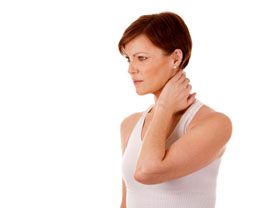A sharp throbbing pain in your neck which radiates downwards to your arms might signify a neck cramp. There are various causes of neck cramps as we as treatment options.

To maintain our posture, the muscles of our neck and head alternatively contract and expand. When a muscle involuntary contacts and then cannot relax at once, it is known as spasm. If this spasm lasts for a longer period of time, it is known as a cramp. Cramps are characterized by extreme pain and it is more common as we age, although children too are prone to cramps. Though cramps are fairly common and every individual encounters it at one point of time or other, neck cramps are relatively rare.
Causes of Neck Cramps
Neck cramps can occur due to awkward sleeping positions, a very soft or too hard mattress, or sudden movement of the neck muscles. You can also get them while yawning.
Sleeping Position
You might suffer from a neck shoulder cramp if you sleep at an awkward position at night. Sleeping without a pillow or a very thin one can also contribute towards neck cramps. Some people sleep in the same position for several hours. This can also contribute towards cramps in neck. Sleeping on the side, by tucking your body in the fetal position, causes the neck muscles to be over-flexed resulting in cramps in neck.
Bad Posture
Bad posture is an unfortunate by-product of our sedentary lifestyle. Bad posture causes cramps and inflexibility in the body. Bad posture is also caused by defective office ergonomics. Ergonomics is the science of ensuring that the workstations are compatible with our body measurements. In simpler terms, it includes elements such as proper height of furniture, correct placement of the computer, lighting, etc. Sitting with a rounded back, putting the entire weight of the body on one hip, and sitting static for prolonged period of time strains the neck and shoulder muscles, leading to neck muscle cramps.
Injury
The main reason for cramps in neck is injury. If you have pulled the muscles of the neck or are suffering from slipped disc, spondylitis or arthritis, it can lead to neck cramp. Cramps in neck might sometimes be brought about by yawning. Basically any sudden and violent movement of the neck can cause the neck muscles to stiffen and cramp.
Treatment and Preventive Measures for Neck Cramps
When we sit for prolonged periods of time, which is generally the case at work, our muscles become fatigued and stressed. Since the human body is not designed to remain static, it adversely affects our posture. Bad posture can lead to chronic pains, reduced lung capacity, abnormal bone growth and digestive disorders.
- To prevent neck cramps due to improper posture, keep your feet flat on the floor while sitting at your desk.
- The monitor of your computer should always be placed at a distance of an arm's length, about 45 - 60 centimeters so that there is minimal strain on your eyes. This also ensures that you don't have to constantly bend forward to read the screen.
- While sleeping, do not sleep in the same position for more than 40 minutes.
- Neck muscle cramps can be treated with over the counter medicines like ibuprofen.
- Acupuncture and acupressure are some alternative therapies that can be used for curing neck cramps.
- Exercises like yoga and tai chi which increases the flexibility of the body can also cure and prevent cramps.
- Dehydration also causes cramps, so always drink 8 - 10 glasses of water everyday.
Consult a physician if cramps persist for a long time. Neck cramp is generally not life-threatening, and with proper rest and medicines, it is possible to cure cramps. However, if you are suffering from neck cramps accompanied by fever, nausea and bleary vision it might point at some underlying diseases. So it is best that you consult a doctor to rule out any serious health problems.


 To maintain our posture, the muscles of our neck and head alternatively contract and expand. When a muscle involuntary contacts and then cannot relax at once, it is known as spasm. If this spasm lasts for a longer period of time, it is known as a cramp. Cramps are characterized by extreme pain and it is more common as we age, although children too are prone to cramps. Though cramps are fairly common and every individual encounters it at one point of time or other, neck cramps are relatively rare.
To maintain our posture, the muscles of our neck and head alternatively contract and expand. When a muscle involuntary contacts and then cannot relax at once, it is known as spasm. If this spasm lasts for a longer period of time, it is known as a cramp. Cramps are characterized by extreme pain and it is more common as we age, although children too are prone to cramps. Though cramps are fairly common and every individual encounters it at one point of time or other, neck cramps are relatively rare.